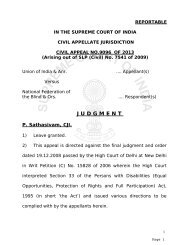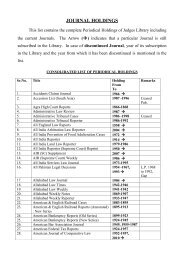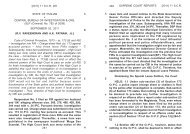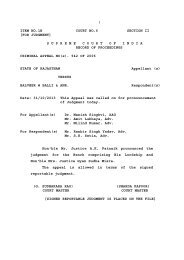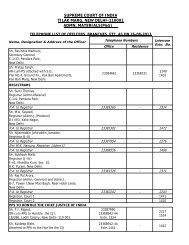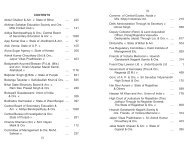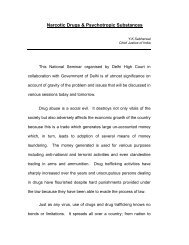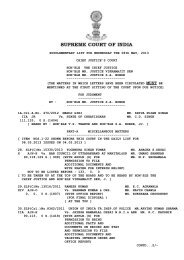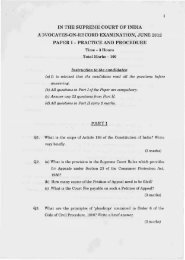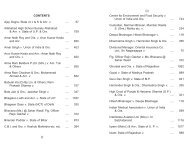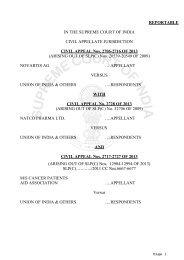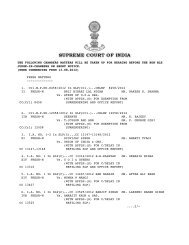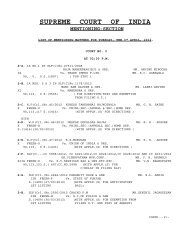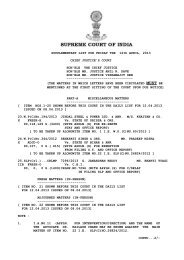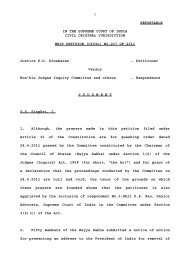Part No.IV - Supreme Court of India
Part No.IV - Supreme Court of India
Part No.IV - Supreme Court of India
You also want an ePaper? Increase the reach of your titles
YUMPU automatically turns print PDFs into web optimized ePapers that Google loves.
SARADAMANI KANDAPPAN v. S. RAJALAKSHMI &<br />
ORS.<br />
the purchaser, totally disconnected with either payment<br />
<strong>of</strong> price or delivery <strong>of</strong> possession. All these provisions<br />
demonstrated that the vendors were in urgent need <strong>of</strong><br />
money, that the purchaser was made aware <strong>of</strong> the<br />
encumbrances, that on the purchaser paying the sale<br />
price, the vendors had to clear the encumbrances and<br />
thereafter convey the property, free from encumbrances.<br />
The contention that the vendors deliberately or<br />
intentionally suppressed any information regarding the<br />
pending encumbrances or the fact that the original<br />
documents were not available and thereby committed<br />
fraud was neither pleaded nor proved. The appellant did<br />
not allege in the plaint, any fraud on the part <strong>of</strong> vendors,<br />
in regard to suppression <strong>of</strong> encumbrances over the<br />
property. The entire plaint tried to justify that the plaintiff<br />
did not commit breach <strong>of</strong> contract by not paying the<br />
balance instalments on 6.4.1981 and 30.5.1981, except for<br />
a stray sentence that the plaintiff will be entitled to<br />
proceed against the third defendants 1 to 3 for damages,<br />
for not performing their part <strong>of</strong> the contract and not<br />
disclosing several prior encumbrances over the property.<br />
In the written statement, the defendants submitted that<br />
the encumbrance certificate upto the year 1980 had been<br />
given to appellant’s husband, which showed the<br />
encumbrance in favour <strong>of</strong> State Bank <strong>of</strong> Mysore, that<br />
plaintiff and her husband both knew before entering into<br />
the agreement <strong>of</strong> sale that original documents were with<br />
the said bank and that therefore the allegation that the<br />
encumbrance was not disclosed was false. It was also<br />
disclosed in the written statement, that a document was<br />
surreptitiously detained by one ‘G’. It was stated that the<br />
defendants intended to utilise the last two instalments for<br />
securing back the original documents by discharging the<br />
loans. It was not disputed that the amount due to ‘G’ was<br />
around Rs.40,000 and the amount due to State Bank <strong>of</strong><br />
Mysore was around Rs.39,000 and any <strong>of</strong> the last two<br />
instalments would have been sufficient to discharge the<br />
891 892<br />
A<br />
B<br />
C<br />
D<br />
E<br />
F<br />
G<br />
H<br />
A<br />
B<br />
C<br />
D<br />
E<br />
F<br />
G<br />
H<br />
SUPREME COURT REPORTS [2011] 8 S.C.R.<br />
said liabilities. The appellant having committed default in<br />
paying the last two instalments which would have<br />
enabled discharging the debts, cannot find fault with the<br />
vendors by contending that they did not secure the<br />
original title deeds. If the mortgage/encumbrance was<br />
made known to appellant’s husband and if it had been<br />
understood that the same would be cleared from the last<br />
<strong>of</strong> the instalments paid by the appellant, the absence <strong>of</strong><br />
original title deeds could not be made a ground for not<br />
paying the last two instalments. The claim <strong>of</strong> the<br />
appellant that the vendors should have cleared all the<br />
encumbrances before payment <strong>of</strong> the last two<br />
instalments is not borne out by any evidence. Even in law,<br />
the obligation <strong>of</strong> the vendors is to convey an<br />
encumbrance free, good and marketable title subject to<br />
contract to the contrary. The stage <strong>of</strong> execution <strong>of</strong> sale<br />
deed had not arrived as the appellants did not pay the<br />
amount due in terms <strong>of</strong> the contract. The appellant<br />
contended that the debt due to the Bank <strong>of</strong> <strong>India</strong> had<br />
been fraudulently suppressed by the vendors. There was<br />
no reference to such a mortgage either in the plaint or the<br />
evidence <strong>of</strong> the plaintiff. <strong>No</strong> one was examined from the<br />
bank nor any document produced to prove the existence<br />
<strong>of</strong> such mortgage. Appellant attempted to produce some<br />
documents relating to the said mortgage with an<br />
application under Order 41 Rule 27 CPC which was<br />
rejected by the High <strong>Court</strong>. What is significant and<br />
relevant is the fact that as on the date <strong>of</strong> the agreement<br />
<strong>of</strong> sale (17.1.1981) the first defendant was not a debtor <strong>of</strong><br />
Bank <strong>of</strong> <strong>India</strong> but on the other hand the bank itself was a<br />
debtor to the extent <strong>of</strong> more than Rs.33,00,000 with<br />
interest. Therefore the contention <strong>of</strong> the appellant that an<br />
encumbrance in favour <strong>of</strong> Bank <strong>of</strong> <strong>India</strong> was in existence<br />
and that was not disclosed and the said liability was not<br />
disclosed, was wholly untenable. From the evidence on<br />
record as rightly held by the courts below it was not<br />
possible to make out either any fraud or any suppression



